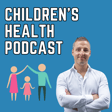
Awesome Dad Spotlight w/ Ricky Varandas (Part 1 of 2)
This is part 1 of 2 of our conversation with Ricky Varandas, host of The Ripple Effect Podcast.
Ricky is an exemplary parent and a wealth of knowledge, which is why I am glad to share this wide-ranging conversation with you.
For part 2, which is for adults only, you can sign up for free to my membership platform. Takes less than a minute: https://members.christianyordanov.com/
Connect with Ricky:
Website: https://rickyvarandas.com/
The Ripple Effect Podcast: https://rickyvarandas.com/category/the-ripple-effect-podcast/
Rokfin: https://rokfin.com/RippleEffect
All his other channel links: https://rickyvarandas.com/channels/
Christian's links:
Children's health consulting (autism, ADHD, gut dysfunction, etc.): https://christianyordanov.com/childrens-health-consulting/
Get my book Autism Wellbeing Plan: How to Get Your Child Healthy: https://www.amazon.com/Autism-Wellbeing-Plan-Child-Healthy/dp/1916393004
Get 3 FREE video courses instantly when you sign up to my members' community here: https://members.christianyordanov.com/
The courses are:
- The Healthy Gluten-Free, Casein-Free Diet for Autism, ADHD, and Gut Dysfunction
- Nutrient Supplements for Autism, ADHD, and Children's Health
- Health Challenges Autistic Children Experience
These courses cover topics such as gut dysfunction and infections, clostridia bacteria, Candida, oxalates, methylation, excitotoxicity, zinc / copper imbalance, going gluten-free and how to do it well, heavy metals and chemical toxicity, probiotic supplementation, mitochondrial dysfunction, immune system dysregulation, neuroinflammation, and much much more. I even show you how to select high-quality supplements and avoid the junk and hype - with real examples and analysis of ingredients on screen...
Every parent of an autistic child must know this information that is why I want to share it with you for free. And parents with kids that have an any health complaint will also learn a ton. In fact, every parent will learn a lot of value information from each of these courses - so please help me share this information with more parents! Thank you so much.
Get the courses: https://members.christianyordanov.com/
Website: http://christianyordanov.com/
